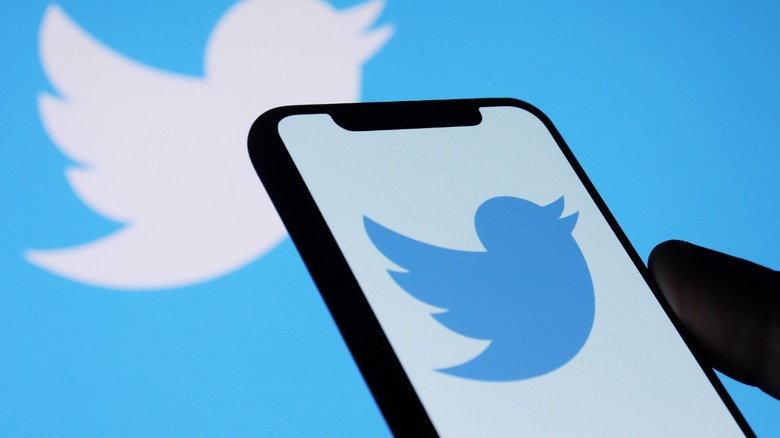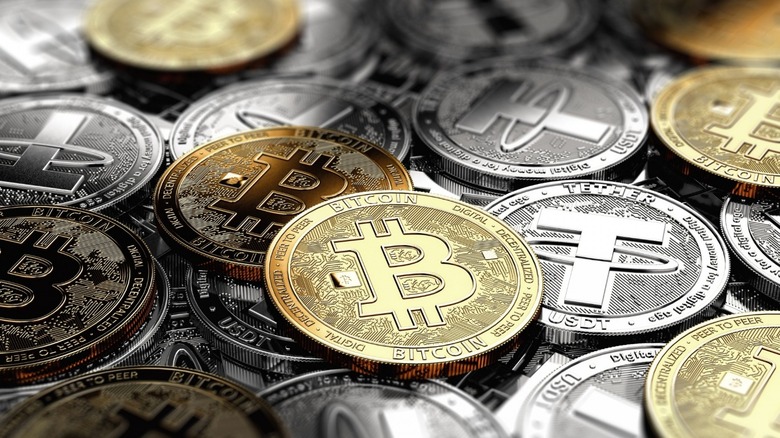The Real Reason This Tech Is Banned
As technology has advanced around the world, we've seen several instances of governments stepping in to ban certain things. When something is banned, the motivation behind those bans can sometimes be confusing, or the real reason can become obfuscated behind misleading stories. Here's the real reason why certain technologies have been banned in certain areas of the world.
Some United States cities ban facial recognition tech
As far as ban-worthy technologies are concerned, this one is a bit of a softball because the reason why people might want it banned is obvious. While facial recognition makes daily life easier for many of us (particularly when it comes to unlocking our phones), many are concerned about the police using facial recognition to identify criminals. It can be a powerful tool for catching at-large criminals and reducing crime, but real-time video facial recognition also has the potential to severely infringe privacy rights.
Like the CNBC report embedded above explains, there's also concern that when facial recognition is used, it can falsely implicate innocent people through algorithmic bias. With all that in mind, it comes as little surprise that some legislatures around the United States have taken steps to ban facial recognition. Mostly we've seen cities banning the use of the technology, but lately, we've also seen state legislatures move to ban it as well. There have even been rumblings of the federal government banning the use of facial recognition, but for now, it's been cities and states driving the pushback.
United Arab Emirates and Saudi Arabia ban BlackBerry
Before the rise of the iPhone and Android, BlackBerry seemed like it was unstoppable. In 2010, BlackBerry drew the ire of the United Arab Emirates government, which announced a ban on certain BlackBerry services such as Messenger and email, citing security concerns as the reason. Saudi Arabia soon followed suit, but as you might have guessed from the rather blunt and nondescript reason from the UAE, there was more to this ban.
Those security concerns the UAE and Saudi Arabian governments cited were actually concerns regarding encryption. Messages sent through BlackBerry Messenger and email were encrypted back in the day, meaning that government officials didn't have access to them and couldn't eavesdrop on BlackBerry communications. Fast forward more than ten years later, and BlackBerry is essentially a thing of the past, but the debate pitting privacy and security against one another rages on with encryption caught in the middle.
Pakistan bans social media... kind of
Pakistan has something of a tumultuous relationship with social media and the internet as a whole. Most recently, we saw the Pakistani government block access to social media apps including Facebook, TikTok, Instagram, WhatsApp, Telegram, and Twitter for four hours on April 16th, 2021. The ban stretched from 11:00 AM to 3:00 PM that day, and according to a report in Pakistani paper Dawn, the government initially only said that it restricted access to those apps to "maintain public order and safety."

Later that day, a more precise reason for the temporary ban came out. In a video published by Dawn, Pakistan's Interior Minister Shiekh Rashid apologized to the public and explained that the temporary ban was implemented because Tehreek-i-Labbaik Pakistan, an extremist political party in the country, had encouraged supporters to take to the street and protest following prayers that day. Therefore, the social media ban was put in place temporarily to stop supporters of TLP from organizing said protests.
China goes after cryptocurrency
From time to time, we'll hear of China banning things as well. In 2021, the country banned cryptocurrency in pretty much every regard. While it had already banned cryptocurrency mining in 2019, last year, it prohibited transactions as well, effectively outlawing cryptocurrency altogether.

There are a variety of reasons why China banned cryptocurrency. Officially, the People's Bank of China said that cryptocurrency "seriously endangers the safety of people's assets" (as reported by the BBC). However, Slate also argues that China banned cryptocurrency because of the energy consumption associated with mining and out of the desire to keep a firm grasp on the economic activity of its citizens. With decentralized cryptocurrencies, it more or less becomes impossible for China to do that.
Russia bans VPNs
VPNs have become handy tools in a world where many governments try to restrict internet traffic (while many more snoop on people's browsing habits) and businesses choose who to serve based on location data. The rise of VPNs obviously does not sit well with some in power, so it came as little shock when Russia moved to severely limit their capabilities back in 2017. The new laws implemented by Roskomnadzor, Russia's internet regulation agency, restricted VPNs from allowing users to access sites blacklisted in the country (via CNN).

Things got even worse in 2021 when Bloomberg reported that Russia outright banned several VPNs for allowing users to access that illegal content online. Some major players were taken out of the game, including NordVPN and Express VPN. Sadly, it seems Russia's war against VPN providers is ramping up rather than cooling off.
China targets video games as well
China has also restricted some forms of entertainment instead of outright banning them. Last year also saw China implement new restrictions on gaming, allowing children under 18 to play only a total of three hours each week. As we head into 2022, China's freeze on new video game licenses continues, with the South China Morning Post reporting that regulators have not approved any new games for sale or distribution in the country since July 2021. As a result, nearly 14,000 game studios in China have gone out of business over the past six months.

China has always had a rocky relationship with the games industry, even though Tencent – one of the biggest games publishers in the world – is based in the country. This is particularly frustrating for foreign companies that see massive potential in the Chinese market regarding gaming. China states that its rules restricting game time for children under 18 were put in place to combat gaming addiction, but the Chinese government hasn't been quite as forthcoming regarding the reason behind the licensing freeze.
The United States and its complex rules on laser pointers
Most of us have probably been told that we shouldn't point laser pointers at aircraft because the light from the laser can be a distraction, limit visibility by flooding the cabin with light, or even temporarily blind pilots if they're strong enough. Over the years, this has led to the belief that lasers over a certain wattage are banned in the United States. While there are some restrictions, it's a little more confusing than that.
LaserPointerSafety.com points out that there technically isn't a laser ban, as in the US, it's "legal under federal law to own a laser of any power." However, laser manufacturers cannot call a laser above five milliwatts a "laser pointer" and market it for those purposes. As long as that laser complies with FDA/CDRH rules, though, it isn't illegal to sell or own.
With that in mind, it's important to note that just because you can own it doesn't mean you have free reign to use it however you want. Aiming a laser pointer of any wattage at an aircraft is a federal crime in the US, so even if you can own lasers of any strength in the country, it's best not to point them at the sky. When even the FBI is telling you not to do it, you should probably resist temptation, lest you end up like one of people in the video embedded above.
The FIA bans six-wheeled F1 cars
For this one, we're going back nearly 50 years to the late 1970s. These days it would be ridiculous to see an F1 car with six wheels, but back in the 1970s, Tyrrell was trying to make it a thing with its six-wheeled P34. The idea was that using four smaller wheels in place of the traditional two front wheels would help with traction and steering while also making the car more aerodynamic.
Of course, it's not as easy as that, and there were plenty of kinks in the design to work out, but the Tyrrell P34 did manage to win a race with its six-wheeled setup. This prompted other manufacturers to develop six-wheeled designs of their own, but it wasn't long before the Fédération Internationale de l'Automobile (FIA), the governing body that sets the rules and regulations for Formula One, stepped in and banned six-wheeled designs. To hear Wired explain it, the FIA was attempting to head off a future where F1 manufacturers were forced to adopt six-wheeled designs just to stay competitive.
The US bans Huawei hardware
This is one that the technophiles of the world will undoubtedly be familiar with already: the United States' ban of Huawei devices. Back in 2018, the US government banned federal agencies from using equipment made by Huawei and ZTE, citing cybersecurity risks and the potential for two companies to spy on federal agents on behalf of the Chinese government.

From there, things spiraled out of control for Huawei, with the US government putting pressure on carriers to drop the company's phones and Google ultimately deciding to cut Huawei off from Android. The federal ban on Huawei hardware continues to this day, and it doesn't seem like those restrictions are going to ease anytime soon.
Fortnite gets taken down from the iOS App Store
Another recent event in the world of technology is the courtroom showdown between Apple and Epic Games. The two companies filed lawsuits against one another back in late 2020, when Epic started advertising alternative payment method in the iOS version of Fortnite that sidestepped the App Store's payment services. Apple responded by removing Fortnite from the iOS App Store, and as their courtroom battle ensued, the game remained inaccessible on Apple's platforms.

That remains true today, even though the court has handed down a decision in the case. While there is a chance that Fortnite will return to the iOS App Store in the future, it will stay delisted at least until the appeals process is over, and that could carry on for months or even longer.
